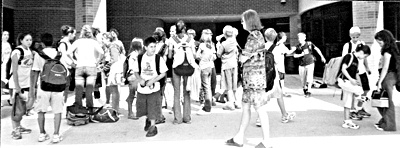All Nonfiction
- Bullying
- Books
- Academic
- Author Interviews
- Celebrity interviews
- College Articles
- College Essays
- Educator of the Year
- Heroes
- Interviews
- Memoir
- Personal Experience
- Sports
- Travel & Culture
All Opinions
- Bullying
- Current Events / Politics
- Discrimination
- Drugs / Alcohol / Smoking
- Entertainment / Celebrities
- Environment
- Love / Relationships
- Movies / Music / TV
- Pop Culture / Trends
- School / College
- Social Issues / Civics
- Spirituality / Religion
- Sports / Hobbies
All Hot Topics
- Bullying
- Community Service
- Environment
- Health
- Letters to the Editor
- Pride & Prejudice
- What Matters
- Back
Summer Guide
- Program Links
- Program Reviews
- Back
College Guide
- College Links
- College Reviews
- College Essays
- College Articles
- Back
From Bystanders to Saviors
Bullying is an ugly occurrence in our society. It is important to teach kids from a young age to recognize and respect differences in others to prevent bullying; however, kids also need to learn how to handle bullying from a viewpoint other than that of someone involved in the incident. The other kids, the bystanders, need to find their voice to help stop these instances from occurring. With the help of online centers for bystander education and incident reporting, bullying will begin to end.
From my education as a peer leader, I've learned the importance of allies. Allies are people who are not necessarily the target group of injustice, but help fight against discrimination. Sometimes targets feel too defeated to confront the people who break their spirits. They need help, and allies are the people to do that. I understand how hard it is to be an ally. When I witness incidents that constitute bullying, I find it hard to always be the first one to help. I don’t want to make the situation worse by humiliating the target, and I also don't want to become the target of harassment. It can be hard to do the right thing. Sometimes it’s easier to be a bystander.
We need to stop being bystanders. We need learn how to recognize incidents that constitute bullying that may not be as obvious as those depicted by media. Such incidents include attacks on aspects of one's identity, such as race, sexual orientation, and body image among others. Constant ridicule of these identifiers is just as traumatizing as daily physical abuse. Once we understand what constitutes bullying, we can learn effective ways to stop situations without making them worse. I believe that this is the trickiest part in dealing with bullying. Intervention can easily make things worse. This step will require special consideration from kids and adults in order to create a full-proof bystander prevention artillery.
Sometimes physical intervention in an altercation is not safe. If we could report incidents anonymously to a centralized place in our schools, we can have a voice against bullying. Paper reports or reports through e-mail become buried and lost. A secure website for every school or youth-oriented institution in which incident reports come directly from eye-witnesses to an appropriate staff can help this problem. While it is important to stop bullying when, and preferably before, it happens, sometimes seemingly resolved issues can lead to more serious situations in the future, so they must be investigated. Anonymous reporting is important in such cases for kids who want to help targets of bullying; kids will be helping to investigate an incident while still feeling safe. Bystanders will no longer be bystanders.
We must realize the potential power of bystanders. By taking advantage of the prominent use of the Internet by youth, schools and other youth-oriented institutions can create anti-bullying and anti-bystander centers for kids. We can stop being bystanders and start being saviors.

Similar Articles
JOIN THE DISCUSSION
This article has 0 comments.
